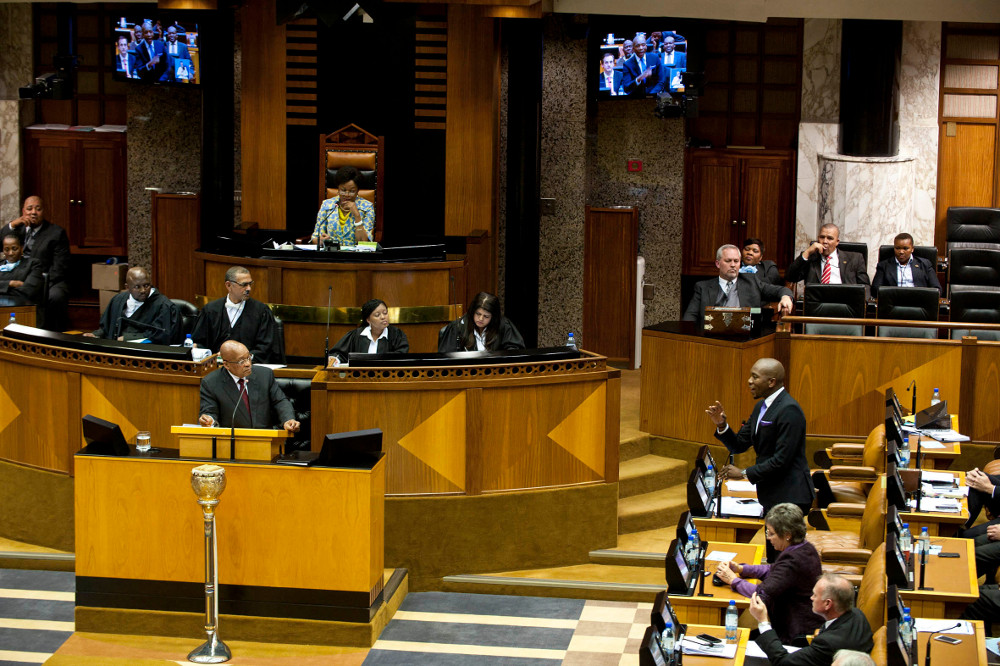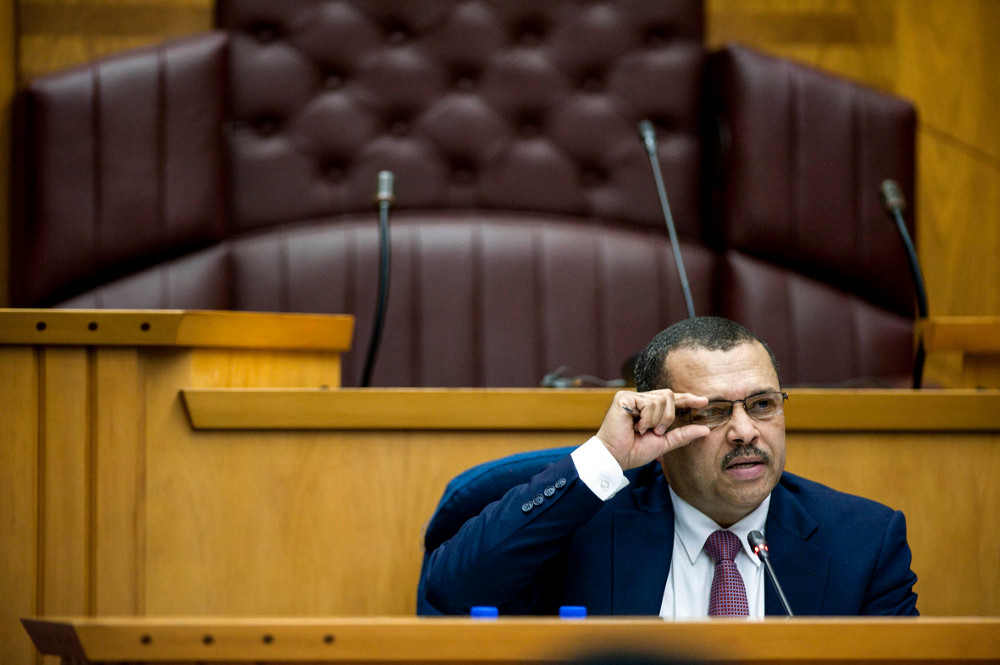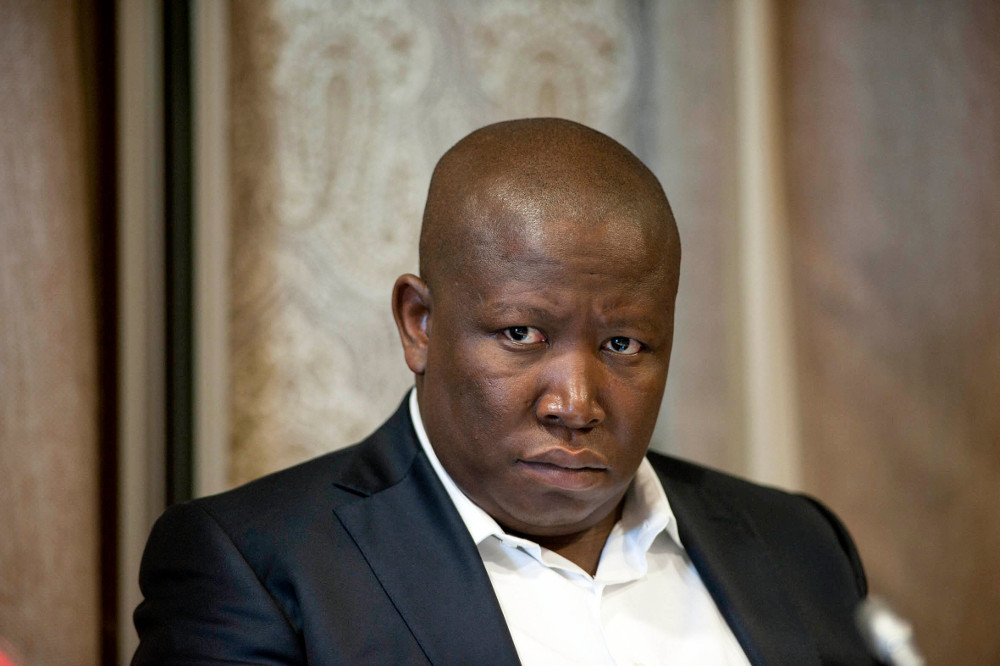A new security assessment of President Jacob Zuma’s rural Nkandla home is in the works, an assessment various institutions agree will in all likelihood find a need for further work to be done to complete, or supplement, over R200-million worth of upgrades already effected.
Parliament, meanwhile, will in coming weeks finalise its current investigation into Nkandla, with no adverse finding whatsoever against Zuma himself.
The opposition Economic Freedom Fighters asked the Constitutional Court to give Zuma lessons in his constitutional obligations, and marching orders on Nkandla, an application that shows little promise of resulting in a hearing.
And despite rumblings from particularly the ANC in Gauteng earlier this year on Zuma’s handling of the Nkandla saga, those noises appear to have been hushed for at least the time being.
So though former ministers, government officials and an architect still face trouble on Nkandla, Zuma himself appears – at least for now – to be off the hook.
Why more steps?
In its final report on Nkandla tabled for consideration last Friday, Parliament’s latest ad hoc committee on the matter recommended “that the executive ensures that all necessary steps are taken to ensure the safety of the head of state and his family is not compromised”.
Why would more steps be required, almost six years into a massive security overhaul?
“Most of the work is incomplete especially those [sic] that relate to security monitoring of the president’s private residence. Consequently, it is clear that the current security arrangements are insufficient and incomplete,” the committee told the national assembly.

The Democratic Alliance’s Mmusi Maimane questions President Jacob Zuma about expenditure, apparently on security measures for his home in Nkandla. (Photos: David Harrison, M&G)
Various MPs expressed shock that a closed circuit TV system supposedly at Nkandla was not operational when they visited the complex.
The committee is not the first group to assert that Zuma is still not sufficiently secure at Nkandla. Almost exactly a year ago the Special Investigating Unit formally recommended another security review of Nkandla “as soon as possible”, and “noted a number of matters of concern” on security there, although in the name of security it would not disclose specifics.
New assessment
Police ministry spokesperson Musa Zondi this week confirmed plans for a new assessment, but said there were no timelines for the process yet as it would depend on discussions with the department of public works.
The department of public works did not respond to questions.
Nkandla has been the subject of four major security assessments and evaluations since 1999 involving either the South African Police Service and South African Defence Force, or both.
Just how more work on Nkandla can be structured to be legal and in compliance with regulations, who will be willing to do the work and who will take responsibility for such a task are all thorny questions complicated by years of investigations.
Nkandla was declared a national key point in 2010. In terms of legislation governing such points, dating from 1980, work necessary to secure a key point must be funded by the owner of the property or from a special government account set up for that purpose. But in an inter-ministerial report on Nkandla released in December 2013, ministers of the security cluster found that complying with that law would be in conflict with the Public Finance Management Act, a modern law that institutes strict controls on the spending of state money, and leaves little room for special accounts.
Cabinet memo
The security cluster ministers also found upgrades at Nkandla should have been governed by a 2003 Cabinet memo, which requires the president to sign off on security measures to be implemented at his private residence, after those measures are determined by the police and costed by the department of public works.
The Nkandla infrastructure should have been subject to an “immovable asset management plan”, the ministers said, which would quantify ongoing maintenance costs (to which no number has yet been put in various investigations), and the capital costs should be apportioned to “the relevant stakeholders”, signalling potential trouble as the SAPS and defence force argues over who requested and should pay for what.

Parliament’s ad hoc committee, chaired by Cedric Frolick, said earlier that the president did not have to pay back the money already spent on his KwaZulu-Natal home.
The individual functionaries, who will have to implement those steps for a new security assessment, will no doubt be mindful of the fact that a dozen department of public works employees involved in previous Nkandla work are being held personally responsible for failing to follow various rules and prescripts.
Two former ministers, who were ultimately responsible for those functionaries, still face censure.
The project leader for a new assessment will also be aware that the previous project leader, architect Minenhle Makhanya, is being held personally liable for R155-million of state money spent on Nkandla in a continuing matter before the high court in Pietermaritzburg.
Subsequent scrutiny
Various companies and contractors who did work on Nkandla found themselves accused of fraud, poor workmanship, and fleecing the public purse during subsequent scrutiny.
When Police Minister Nathi Nhleko suggested in July that more money would have to be spent on Nkandla, ANC secretary general Gwede Mantashe characterised it as “reckless” in its timing.
These issues will face a set of ministers and technocrats different from those who dealt with Nkandla between 2009 and 2012, but will not be Zuma’s direct responsibility. The only responsibility he will face in the renewed security assessment and its implementation, according to the findings of the various investigations to date, is to assume ethical responsibility for the effective application of state funds. Demanding as much from those intimately involved, and holding them accountable should they fail, will likely satisfy that requirement.
That represents only a temporary reprieve for Zuma, however.
In mid-June, chairperson of the ANC in Gauteng, Paul Mashatile, sought to distance the party from Nhleko’s report, which formed the basis of the parliamentary ad hoc committee’s findings, and the suggestion that more money would have to be spent on Nkandla.
Not the position of the ANC
That was not the position of the ANC, Mashatile said. He was subsequently backed by the party in the province.
Well-informed speculation at the time spoke of a possibility that the ANC would be asked to consider requiring Zuma to pay personally for any new work. Such speculation died down in the two months since, but insiders this week suggested the plan was not yet entirely dead.
Zuma also faces the prospect of a newly empowered public protector demanding, again, that he repay the state for some of the personal benefit he has derived from the Nkandla project. In September the Supreme Court of Appeal will hear a different matter, which has been brought by the Democratic Alliance, that has the potential of declaring Madonsela’s findings to be binding.
And should the Special Investigating Unit’s R155-million claim against architect Makanya fail, the unit has the option of trying to recover the money from those unduly enriched – a group it found to include Zuma himself. – With additional reporting by Qaanitah Hunter and Matuma Letsoalo
EFF goes for the constitutional jugular
The Economic Freedom Fighters do not have a particularly good chance of being heard on Nkandla before the Constitutional Court, but nonetheless in court papers it took the opportunity to express its intense displeasure with Parliament, the speaker Baleka Mbete and President Jacob Zuma.
On August 4, the party finalised papers asking the court to declare that both Parliament and Zuma, in their handling of issues related to Nkandla, had failed their respective duties to uphold the Constitution. That was several days before Parliament’s ad hoc committee on Nkandla tabled its report, and well before Zuma appeared in Parliament to answer, among others, an EFF question about Nkandla – but only one day after public protector Thuli Madonsela said it was up to those who thought her office required protection to do the protecting.
The EFF told the court in its notice of motion that Zuma should be forced to give effect to Madonsela’s recommendations, and the court should declare that Zuma’s failure to do so, and Parliament’s failure to force him to do so, was a failure of their constitutional obligations.
The court accepts direct applications under only exceptional circumstances and at its own discretion. This week, experts said Parliament had not yet formally adopted the ad hoc committee report, which would conclude its Nkandla investigation; the Nkandla matter would be heavily influenced by a Supreme Court of Appeal hearing in September, which itself is likely to be taken on appeal to the Constitutional Court; and that the EFF would be hard-pressed to explain why the Nkandla matter was urgent.

Unhappy: EFF leader Julius Malema.
The experts all agreed that the EFF’s chances of securing a hearing were slim. But the application itself gave EFF leader Julius Malema the opportunity to promise Zuma the party would see him in court – and it gave the party a fresh platform to express unhappiness with not only Zuma but also Mbete. The EFF deputy president, Floyd Shivambu, said in a supporting affidavit Zuma had violated the Constitution, committed a serious constitutional breach, and had undermined the independence and effectiveness of the public protector.
Shivambu said Mbete, though only cited nominally as a respondent to represent the National Assembly, was required to act impartially in her role.
“The experience of the EFF with the current speaker has been that she is not impartial, is prone to procedural lapses, and openly hostile to the EFF.”
To date, the Democratic Alliance has been the party leading the various legal threats and challenges on Nkandla, but it said this week it would not join the EFF in its approach to the court.
The DA’s James Selfe said the party would wait for a determination in its Supreme Court of Appeal case, which is seeking clarity on the public protector’s powers in the matter regarding the SABC’s chief operating officer, Hlaudi Motsoeneng. It is scheduled to be heard in Bloemfontein on September 18.
If the protector’s findings are found to be binding, Selfe said, that would enable a demand for the implementation of her findings on Nkandla.
“The issue regarding Nkandla and Hlaudi Motsoeneng are very similar, except in the matter of Hlaudi Motsoeneng the remedial action recommended by the public protector is very precise,” Selfe said. – Phillip de Wet and Qaanitah Hunter
When Parliament rewrote history
The latest ad hoc committee on Nkandla last week tabled its report for consideration by the National Assembly, with every sign that the report will be adopted by Parliament as a whole – despite the fact that it contains several blatant and critical factual inaccuracies.
In several instances the committee (officially titled “Ad hoc committee to consider the report of the minister of police in reply to recommendations in the report of the ad hoc committee to consider the report by the president regarding security upgrades at the Nkandla Private Residence of the president”) accepted assertions by Police Minister Nathi Nhleko that are flatly contradicted by documents.
Facts accepted by the committee, with its stamp of approval either directly or tacitly, include that:
- Nhleko could find zero evidence that President Jacob Zuma had “requested anything to be constructed” in his perusal of “all reports related to” Nkandla. In her March 2014 report on Nkandla, public protector Thuli Madonsela relates that Zuma personally told her he had “requested the building of a larger kraal”;
- The figure of R246-million spent on Nkandla was a cost estimate “by the media and opposition parties”. The R246-million number actually came from Madonsela’s report, in which she “conservatively estimated” that to be what would be required from state coffers before the project is completed, based on work that still had to be done at the time. The actual number (incorrectly rounded down instead of up by Madonsela herself) is R246 631 303.04;
- Implicitly, the only “alleged non-security features” at Nkandla are the swimming pool, animal enclosures and a social node. The Special Investigating Unit, in a report on an investigation commissioned by Zuma, pointed to roads built for the sole use of the Zuma family, air conditioning installed in family residences, and extensive landscaping around the private residences; and
- Nhleko’s status as a Cabinet minister does not oblige him to “make favourable judgments towards the president” because the president also appoints people such as judges to their positions.
The committee apparently did not notice that it requires a two-thirds majority of the National Assembly to remove the likes of a judge (and similar presidential appointees) from office, whereas a Cabinet minister serves at the absolute pleasure of the president and is specifically denied any security of tenure.
Consideration of the report by the National Assembly was yet to be scheduled as the Mail & Guardian went to print, but was expected before the end of August.
Both the DA and the EFF were expected to vote against its adoption, as are the African Christian Democratic Party and Freedom Front Plus, but the vote would be easily carried by the ANC, which has welcomed the report as tabled. – Phillip de Wet